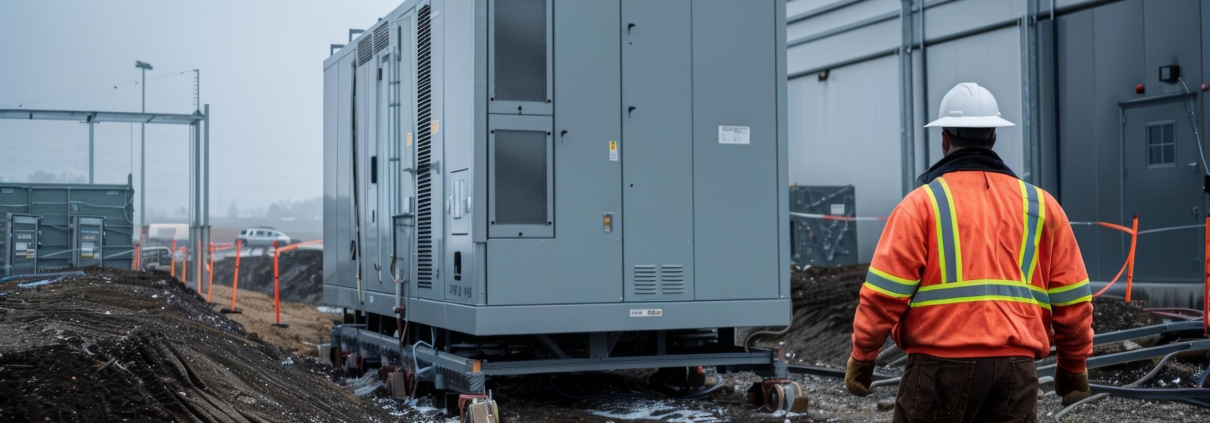The Importance of Generator Maintenance for Commercial Buildings
For any commercial building, having reliable backup power is not just a luxury—it’s a necessity. In today’s world, where businesses rely heavily on electricity for everything from operating critical machinery to running everyday tasks like lighting, HVAC, and computers, a power outage can lead to disastrous consequences. Whether it’s a retail store, office building, or manufacturing facility, a sudden loss of power can halt operations, leaving businesses scrambling to recover. The ripple effects of a power outage often go beyond the obvious loss of productivity and revenue. Customer service suffers, sensitive equipment may be damaged, and, in worst cases, the safety of employees and clients could be compromised.
That’s where backup generators come in. They are designed to keep your business running when the main power source fails. But like any piece of machinery, a generator needs regular attention to perform its job effectively. Simply installing a generator isn’t enough—you need to ensure it’s properly maintained so that it will work when you need it most. This is especially important for facility managers and business owners who are responsible for keeping everything running smoothly. In this article, we’ll dive into why generator maintenance is so crucial for commercial buildings and how it can protect your business from the financial and operational chaos that comes with power outages.
The Impact of Power Outages on Commercial Buildings
Power outages can vary in cause, frequency, and length, but the effects are almost always damaging for businesses. Outages are typically divided into two categories: planned and unplanned. Planned outages are scheduled by utility companies, often for maintenance or upgrades, and businesses usually receive notice in advance. While these are easier to prepare for, they can still disrupt operations if no backup power is available. On the other hand, unplanned outages are much more unpredictable and can occur due to various factors, such as severe weather, accidents, or issues with the power grid itself. These outages can last from a few minutes to several hours—or even days in extreme cases.
The financial impact of power outages on commercial buildings can be staggering. Imagine a retail store losing power on a busy shopping day. Customers are unable to make purchases, inventory management systems may go down, and security systems could be compromised. The longer the outage, the more revenue is lost. Similarly, for office-based businesses, a loss of power can result in data loss, halted projects, and a breakdown in communication, all of which can severely affect productivity. For manufacturers, the risks extend to damaged equipment and halted production lines, which can lead to enormous losses.
Beyond the financial implications, power outages also pose safety hazards. Critical systems like lighting, HVAC, and security cameras could go offline, creating an unsafe environment for employees and visitors. Additionally, elevators and fire alarms could malfunction, increasing the risk of accidents. This is why a robust business continuity plan is essential for any commercial establishment. Reliable backup power is a crucial part of that plan, ensuring your business can continue operating even during a prolonged outage. But without proper generator maintenance, that continuity could be jeopardized.
Understanding Commercial Building Generators
Generators play a vital role in keeping commercial buildings functional during power outages. But how exactly do they work? A commercial building generator is essentially a backup power source that kicks in when the main electrical supply is interrupted. These generators can automatically detect when a power failure occurs and start generating electricity almost instantly, ensuring minimal disruption to daily operations.
There are different types of generators used in commercial settings, with the most common being diesel and natural gas generators. Diesel generators are known for their reliability and ability to provide large amounts of power for extended periods. Natural gas generators, while slightly more complex, are often praised for being more environmentally friendly and having a continuous fuel supply, as they can tap directly into natural gas lines. Each type of generator has its pros and cons, and the choice usually depends on the size of the building and the specific power needs of the business.
A typical generator system consists of several components. The engine, which powers the generator, is the heart of the system, converting fuel into mechanical energy to generate electricity. The fuel tank stores the fuel (whether diesel, natural gas, or another type), ensuring the generator can run for a significant amount of time during an outage. The transfer switch is another crucial component. It allows the generator to automatically switch from the main power supply to the backup generator when an outage occurs. An Automatic Transfer Switch (ATS) is especially valuable in commercial buildings because it ensures a seamless transition without any manual intervention. This means that in the event of an outage, the generator will start working immediately, minimising downtime and preventing operational disruptions.

Why Generator Maintenance is Crucial
Regular generator maintenance is essential to avoid system failure when you need it most. Imagine investing in a generator, trusting it to keep your business running during a power outage, only to find out that it doesn’t start due to a lack of proper upkeep. Unfortunately, this is a common issue for businesses that neglect regular maintenance. Generators are complex machines with many moving parts, and without routine checks, components can wear out, fluids can deplete, and electrical connections can corrode—all leading to a malfunction when the generator is needed.
One of the key reasons generator maintenance is crucial is that it significantly extends the lifespan of the equipment. A well-maintained generator can last for many years, providing reliable backup power without the need for constant repairs or replacements. On the other hand, a neglected generator will degrade much faster, leading to frequent breakdowns and costly repairs.
Safety is another major concern. Poorly maintained generators can pose a variety of risks, including fire hazards and carbon monoxide leaks. Additionally, generators that are not regularly checked for performance may overheat or develop dangerous electrical faults, putting both the building and its occupants at risk. By scheduling regular maintenance, you not only ensure the generator will work during an outage but also minimise these potential hazards, keeping your building safe.
Essential Generator Maintenance Practices
Maintaining a commercial generator involves several key practices, which can be divided into monthly and annual tasks.
- Monthly Maintenance:
Regular, simple checks are crucial for catching any potential issues early. Start with visual inspections of the entire system, looking for any obvious signs of wear and tear, leaks, or loose connections. Checking fluid levels—such as oil, coolant, and fuel—is also essential. Low levels can cause the engine to overheat or even fail during use. The generator’s battery is another critical component to monitor. A dead or weak battery will prevent the generator from starting, so it’s important to regularly test the battery and clean its terminals to ensure it’s in good condition.
- Annual Maintenance:
Annual maintenance requires a more in-depth inspection, often performed by a qualified technician. This is when you’ll want to replace the oil and filters, which accumulate debris over time and can reduce the engine’s efficiency. Load testing is another important annual task. This involves running the generator at its full capacity to ensure that it can handle the building’s power needs during an actual outage. Finally, a thorough cleaning of the internal components and checking the fuel system for blockages or contamination is essential for optimal performance.
- Additional Considerations:
It’s always recommended to use genuine parts when performing maintenance. Non-genuine parts may not meet the manufacturer’s specifications, which could lead to reduced performance or even void the generator’s warranty. Following the manufacturer’s maintenance guidelines will ensure the generator operates as intended and prevent unnecessary wear.
Benefits of Regular Generator Maintenance
The benefits of regular generator maintenance are clear. First and foremost, it ensures that your generator will work when you need it. A well-maintained generator system is far more reliable than one that’s neglected, reducing the risk of unexpected breakdowns during a critical power outage. This reliability is particularly important for businesses that cannot afford any downtime, such as hospitals, data centres, or manufacturing facilities.
Regular maintenance also saves money in the long run. By identifying and addressing small issues before they become big problems, businesses can avoid costly repairs or even the need for a full generator replacement. Preventative maintenance is always more affordable than emergency repairs, and it minimises disruption to business operations.
Perhaps most importantly, regular maintenance provides peace of mind. Knowing that your backup power system is ready to go in case of an emergency allows you to focus on other aspects of your business, without worrying about the next power outage.
To ensure your commercial building is prepared for any power outage, it’s essential to invest in regular generator maintenance. Contact a trusted service provider today to schedule routine checks and keep your backup power system in top shape. Don’t wait until it’s too late—protect your business and ensure continuous operations with proper generator maintenance.






